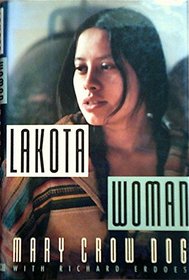Helpful Score: 7
While grammar errors abound and the story often seems disjointed, Crow Dog's true-life account of the AIM movement of the 70s gives a rare glimpse into a world not many try--or are able to--venture into. The prose is filled with emotion and while things never quite end up how the reader thinks they are going to, Crow Dog does provide an intimate portrait into the lives and treatment of a group of Native Americans.
Helpful Score: 6
A good perspectice of a woman in a culture very different than most people in America.
Helpful Score: 4
Very powerful autobiography of Mary Brave Bird, who grew up in a one-room cabin without running water or electricity on a South Dakota reservation. A moving 'view from the inside'. Excellent read. Over 250 pages.
Helpful Score: 3
Very interesting to hear the story from the side of the Indians.
Helpful Score: 3
This is a wonderful Biography of an Native american woman who had so much courage to endure terrible terrible treatment. I could not put the book down.
Helpful Score: 2
A good first-hand account of things, but the storyline jumped around from year to year. Some stories were retold several times with additional perspective throughout the book.
Helpful Score: 2
From the back cover: Mary Brave Bird grew up fatherless in a one-room cabin, without running water or elecricity, on a South Dakota reservation. Rebelling against the aimless drinking,punishing missionary school, narrow strictures for women, and violence and hopelessness of reservation life, she joined the new movement of tribal pride sweeping Native American communities in the sixties and seventies and eventually married Leonard Crow Dog, the movement's chief medicine man, who revived the sacred but outlawed Ghost Dance.
Helpful Score: 2
From the back cover: "Mary Brave Bird grew up fatherless in a one-room cabin, without running water or electricity, on a South Dakota reservation. Rebelling against the aimless drinking, punishing missionary school, narrow strictures for women, and violence and hopelessness of reservation life, she joined the new movement of tribal pride sweeping Native American communities in the sixties and seventies and eventually married Leonard Crow Dog, the movement's chief medicine man, who revived the sacred but outlawed Ghost Dance. LAKOTA WOMAN is a unique document unparalleled in American Indian literature, a story of death, of determination against all odds, and of the cruelties perpetrated against American Indians during the last severl decades. It is also a deeply moving account of a woman's triumphant struggle to survive in a hostile world."
Helpful Score: 1
A disappointment. This contemporary biography of a Lakota Sioux woman who drifts into the AIM movement in the 1970s neither enlightens or inspires. Disjointed and emotionless, it's further flawed by sloppy editing.
"The moving story of a Native American woman who fought her way out of despair and bitterness to find the righteous ways of her ancestors." William M. Kunstler
This is an interesting and moving book, capturing the life a women in the midst of the American Indian Movement in the 1970's. She describes life on the reservation as a younger woman and details the harrowing and sordid quality of life, revealing the poverty, struggle and rampant racism of her native South Dakota. Moved by the activism of A.I.M., she gives first hands accounts of the Trail of Broken Treaties and the seizure of Wounded Knee.
Excellent read! An inspiring story of one woman who found the way to rise above what exists around her to create something somewhat better. This is not a sunshine & roses happy ending kind of story. But what she accomplishes with the means she has is much to be admired! Mirrors much of what I learned from a young friend among the Sioux people at the beginning of the '70s & saw unfold through those troubling years. A compelling read as well. Sheds clear light on some ugly, unwelcome truths along the way.




